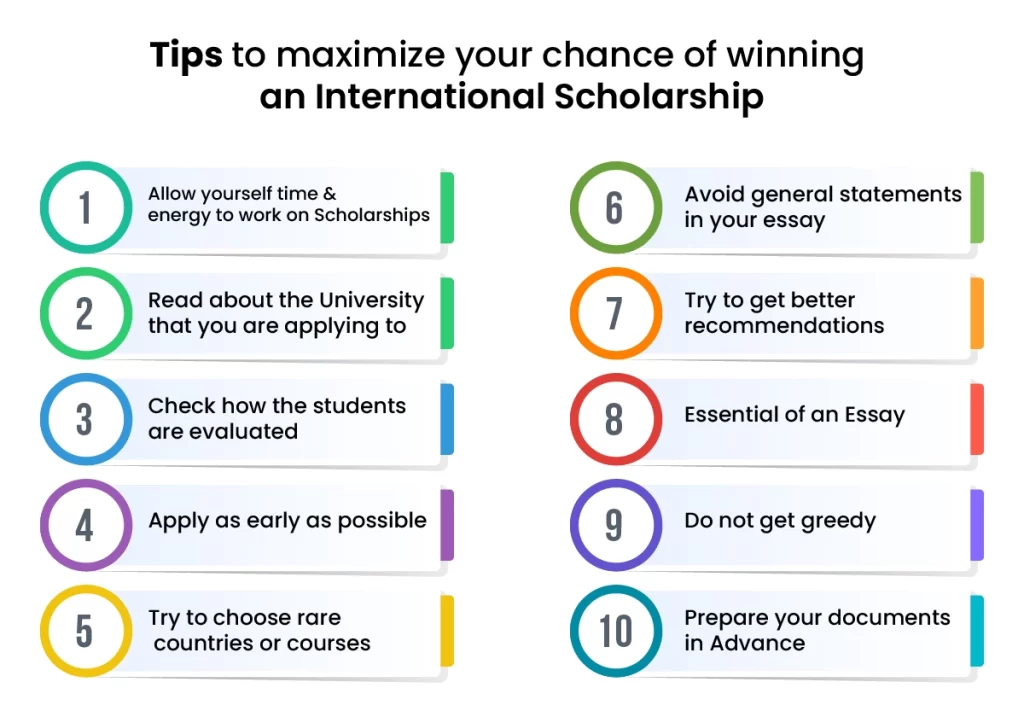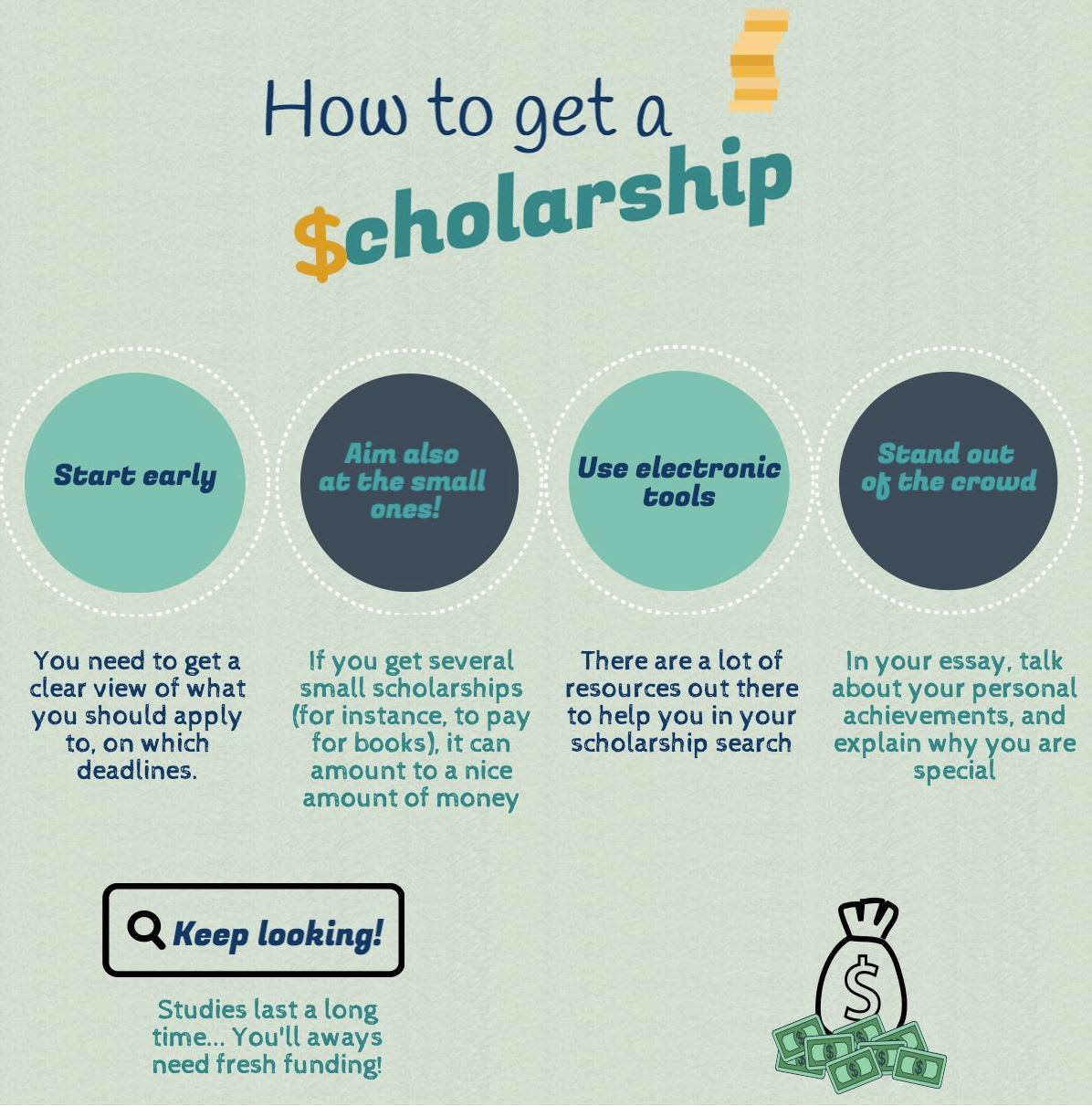How to Maximize Your Chances of Finding a Scholarship

Securing a scholarship can significantly ease the financial burden of education. However, the application process is often competitive. To maximize your chances, a strategic approach is crucial. This article delves into proven methods to enhance your scholarship prospects, starting with diligent research. We'll explore how to identify scholarships aligned with your profile, craft compelling applications, and showcase your unique strengths. Discover the power of networking, seeking recommendations, and understanding eligibility criteria. By following these insights, you can significantly increase your odds of winning the funding you need to achieve your academic aspirations.
How to Sharply Elevate Your Scholarship Success Rate
To dramatically increase your chances of securing a scholarship, a multi-faceted approach is crucial. It's not merely about applying; it's about strategically positioning yourself as the ideal candidate. This involves meticulous research, diligent application preparation, and proactive networking. Start early, meticulously track deadlines, and tailor each application to the specific requirements and values of the awarding organization. A strong academic record is foundational, but demonstrating leadership, community involvement, and a compelling personal narrative is equally vital. Remember, scholarships are investments in future potential, so showcase your aspirations and how the scholarship will enable you to achieve them.
Cultivate an Exceptional Academic Profile
A strong GPA and impressive standardized test scores (if applicable) are the bedrock of your scholarship application. Focus on excelling in challenging coursework and seek opportunities to demonstrate academic curiosity beyond the classroom. Take on advanced courses, participate in academic competitions, and pursue independent research projects to showcase your intellectual capabilities and dedication to learning. Remember that demonstrating continuous improvement and a commitment to academic excellence is more important than perfection.
Unearth Niche Scholarship Opportunities
Don't solely rely on popular, widely advertised scholarships, as the competition is fierce. Delve deeper into researching niche scholarships that cater to specific demographics, academic majors, career aspirations, or extracurricular activities. Explore local community foundations, professional organizations related to your field of study, and even your employer's scholarship programs. The less competition, the higher your odds of success, so tailor your search to unearth hidden gems that align perfectly with your unique profile.
Craft Compelling and Authentic Essays
Your scholarship essay is your opportunity to showcase your personality, values, and aspirations. It's where you can connect your academic achievements with your personal experiences and articulate how the scholarship will enable you to achieve your goals. Be authentic, vulnerable, and demonstrate genuine passion for your chosen field of study. Address the prompt directly, providing concrete examples and compelling anecdotes that illustrate your unique qualities and potential. Ensure your essay is meticulously proofread for grammar and spelling errors and seeks feedback from trusted mentors or teachers.
Seek Strong Letters of Recommendation
Letters of recommendation can significantly enhance your scholarship application. Choose recommenders who know you well and can speak to your academic abilities, character, and potential. Provide them with ample time to write thoughtful and personalized letters, furnishing them with your resume, transcript, and a summary of your achievements and goals. Ask them to highlight your unique qualities and provide specific examples of your accomplishments, demonstrating why you are deserving of the scholarship.
Demonstrate Active Community Involvement
Scholarship committees often seek candidates who are not only academically strong but also actively engaged in their communities. Volunteer your time, participate in extracurricular activities, and take on leadership roles in organizations that align with your values. Demonstrate a commitment to service, a willingness to contribute to something larger than yourself, and a passion for making a positive impact on the world. Document your community involvement meticulously, highlighting the skills you have developed and the impact you have made.
| Scholarship Type | Eligibility Criteria | Award Amount (Example) | Key Strategies for Success |
|---|---|---|---|
| Merit-Based | High GPA, Strong Test Scores, Academic Achievements | $5,000 - Full Tuition | Focus on academic excellence, highlight awards and honors, submit compelling essays. |
| Need-Based | Demonstrated Financial Need, FAFSA Completion | Varies Widely | Complete FAFSA accurately, highlight financial hardships in your essay, seek guidance from financial aid advisors. |
| Specific Major/Field | Enrollment in a Specific Academic Program | $1,000 - $10,000 | Showcase passion and aptitude for the field, highlight relevant coursework and experiences, network with professionals in the field. |
| Underrepresented Groups | Membership in a Specific Demographic Group (e.g., ethnicity, gender) | Varies Widely | Highlight your unique background and experiences, demonstrate commitment to community, connect with organizations supporting your demographic group. |
| Athletic Scholarships | Exceptional Athletic Abilities, Meeting NCAA Requirements | Partial to Full Ride | Excel in your sport, Maintain academic eligibility, Network with college coaches, Attend recruiting events. |
What is the #1 way to increase your chances for a scholarship?

Strong Academic Record
A strong academic record is the foundation of any successful scholarship application. This includes maintaining a high GPA, excelling in challenging courses, and consistently demonstrating a commitment to learning. Scholarship committees often use GPA and standardized test scores as initial screening criteria. Focusing on your studies will yield a higher chance of recognition.
- Prioritize academics: Make studying a priority and develop effective study habits.
- Challenge yourself: Take challenging courses to showcase your academic abilities.
- Seek help when needed: Don't hesitate to ask for help from teachers, tutors, or classmates if you're struggling with a particular subject.
Compelling Essays and Personal Statements
Scholarship essays and personal statements are your opportunity to showcase your personality, experiences, and aspirations. A well-written essay can set you apart from other applicants, even those with similar academic credentials. It's crucial to craft a compelling narrative that highlights your unique qualities and demonstrates why you deserve the scholarship.
- Start early: Give yourself ample time to brainstorm, write, and revise your essay.
- Be authentic: Write in your own voice and share your personal experiences and perspectives.
- Proofread carefully: Ensure your essay is free of grammatical errors and typos.
Meaningful Extracurricular Involvement
Scholarship committees are looking for well-rounded individuals who are actively involved in their communities. Meaningful extracurricular involvement demonstrates leadership skills, teamwork abilities, and a commitment to making a difference. It's not enough to simply list activities; you need to showcase your contributions and the impact you've made.
- Choose activities you're passionate about: Focus on activities that genuinely interest you.
- Take on leadership roles: Seek opportunities to lead or contribute significantly to your chosen activities.
- Quantify your impact: Use numbers and data to showcase the impact of your involvement.
Targeted Scholarship Applications
Avoid the "spray and pray" approach. Instead, focus on applying for scholarships that align with your academic interests, extracurricular activities, and personal background. Research scholarships thoroughly and tailor your application materials to meet the specific requirements of each scholarship.
- Research scholarship opportunities: Use online databases, school counselors, and community organizations to find scholarships.
- Tailor your applications: Customize your essays and application materials to address the specific criteria of each scholarship.
- Meet all deadlines: Submit your applications before the deadline to ensure they are considered.
Strong Letters of Recommendation
Letters of recommendation can provide valuable insights into your character, work ethic, and potential. Choose recommenders who know you well and can speak to your strengths and accomplishments. Provide them with ample time and information to write a strong and persuasive letter.
- Choose recommenders wisely: Select teachers, mentors, or supervisors who know you well and can provide specific examples of your abilities.
- Provide recommenders with information: Give them your resume, transcript, and a brief description of the scholarships you're applying for.
- Thank your recommenders: Express your gratitude for their time and effort.
How to be more likely to get a scholarship?
Academic Excellence
Maintaining a high GPA is crucial. Focus on achieving excellent grades in challenging courses. Additionally, strong standardized test scores (SAT/ACT) can significantly enhance your application. Invest time in preparation and consider taking practice tests to improve your performance.
- Study diligently and seek help when needed.
- Take challenging courses to demonstrate academic rigor.
- Prepare thoroughly for standardized tests.
Extracurricular Involvement and Leadership
Participate actively in extracurricular activities that align with your interests. Showcase leadership roles where possible to demonstrate initiative and responsibility. Consistency and dedication in your chosen activities are more impactful than spreading yourself too thin.
- Join clubs or organizations related to your passions.
- Seek leadership opportunities within those organizations.
- Demonstrate commitment and dedication over time.
Compelling Essays and Personal Statements
Craft a compelling narrative that highlights your unique qualities and experiences. Show, don't tell. Use vivid language and specific examples to illustrate your points. Proofread carefully for errors in grammar and spelling. Tailor your essay to the specific requirements of each scholarship application.
- Brainstorm ideas and create an outline before writing.
- Showcase your personality and passions.
- Proofread meticulously and seek feedback.
Strategic Scholarship Research and Application
Research scholarships thoroughly to identify opportunities that align with your profile. Utilize online databases, school resources, and community organizations. Pay close attention to eligibility criteria, deadlines, and application requirements. Customize your application to each specific scholarship.
- Use scholarship search engines and databases.
- Network with your school counselor and community organizations.
- Tailor each application to the specific scholarship.
Strong Letters of Recommendation
Request letters of recommendation from teachers, counselors, or mentors who know you well. Provide them with ample time and information about your accomplishments and goals. Follow up to ensure they have submitted the letters by the deadline. Choose recommenders who can speak to your strengths and character.
- Ask recommenders well in advance of the deadline.
- Provide them with a resume, transcript, and personal statement.
- Thank them for their time and effort.
How do I make sure I get a scholarship?
Academic Excellence: Building a Strong Foundation
Maintaining a high GPA is crucial for most scholarships. In addition to earning good grades, take challenging courses that demonstrate your academic abilities and willingness to learn. Your academic record provides tangible evidence of your capabilities.
- Prioritize your studies: Dedicate sufficient time to studying and completing assignments.
- Seek help when needed: Don't hesitate to ask teachers or tutors for assistance if you're struggling with a particular subject.
- Choose challenging coursework: Enroll in AP, IB, or honors classes to demonstrate your academic potential.
Extracurricular Activities: Showcasing Your Potential
Beyond academics, demonstrate your well-roundedness through extracurricular involvement. Choose activities that you are passionate about and that allow you to develop leadership skills, teamwork abilities, and a commitment to making a difference.
- Participate actively: Don't just join clubs; take on leadership roles and contribute meaningfully.
- Show commitment: Stick with your activities for an extended period to demonstrate your dedication.
- Highlight your achievements: In your scholarship application, showcase your accomplishments and contributions in each activity.
Crafting a Compelling Personal Statement
Your personal statement is your chance to tell your story and connect with the scholarship committee on a personal level. Be authentic, engaging, and demonstrate why you deserve the scholarship. Focus on what makes you unique.
- Brainstorm ideas: Think about your experiences, goals, and values, and how they relate to the scholarship criteria.
- Write a captivating introduction: Grab the reader's attention from the beginning.
- Proofread carefully: Ensure your essay is free of grammar, spelling, and punctuation errors.
Securing Strong Letters of Recommendation
Letters of recommendation provide valuable insights into your character, abilities, and potential. Choose recommenders who know you well and can speak to your strengths and achievements.
- Ask early: Give your recommenders ample time to write thoughtful letters.
- Provide information: Share your resume, transcript, and personal statement with your recommenders to help them write a comprehensive letter.
- Follow up: Thank your recommenders for their time and effort.
Strategic Scholarship Searching and Application
Research and apply for a variety of scholarships to increase your chances of success. Explore smaller, more niche scholarships that may have less competition. Also, pay attention to deadlines and submit complete applications.
- Use online scholarship search engines: Explore websites like Fastweb, Scholarships.com, and College Board to find scholarships that match your profile.
- Check with your school counselor: Your school counselor can provide information about local scholarships and other resources.
- Pay attention to deadlines: Create a calendar and create a schedule to not miss any opportunities.
What is the best way to find scholarships?

Start with your High School or College Counseling Office
Your high school counselor or college financial aid office is an invaluable resource. They often have information on local scholarships, scholarships specifically for students at your school, and general advice on the application process. These resources are often tailored to your specific academic profile and location, making them highly relevant.
- Schedule an appointment with your counselor or financial aid advisor to discuss your financial needs and scholarship goals.
- Ask about any specific scholarships offered by your school or local organizations.
- Review any scholarship lists or databases that your school provides.
Utilize Online Scholarship Search Engines
The internet offers numerous scholarship search engines that can help you identify potential funding opportunities. However, it's crucial to use reputable and trustworthy platforms. Avoid websites that ask for fees or seem too good to be true, as they may be scams.
- Explore well-known and respected search engines like Fastweb, Scholarships.com, Sallie Mae, and Peterson's.
- Create profiles on these sites, providing detailed information about your academic background, interests, and financial needs.
- Set up alerts to receive notifications about new scholarships that match your profile.
Search for Scholarships Based on Specific Criteria
Instead of casting a wide net, focus your search on scholarships that match your specific characteristics and achievements. This increases your chances of standing out from the competition. Consider your field of study, ethnicity, gender, religious affiliation, disabilities, and any extracurricular activities.
- Research scholarships specifically for students in your chosen major or field of study (e.g., engineering, nursing, business).
- Look for scholarships targeted at specific ethnic or minority groups.
- Investigate scholarships for students with disabilities or specific medical conditions.
Network and Connect with Organizations
Sometimes, scholarships are not widely advertised online. Networking and connecting with relevant organizations can uncover hidden opportunities. Contact professional organizations, community groups, and local businesses related to your field of interest.
- Attend industry events, career fairs, and conferences to meet professionals in your field.
- Reach out to organizations related to your extracurricular activities or hobbies.
- Inquire about scholarship opportunities from companies that offer internships or co-op programs.
Stay Organized and Meet Deadlines
Finding scholarships is only half the battle. Staying organized and meeting application deadlines is essential. Create a spreadsheet or use a scholarship tracking tool to manage your applications and deadlines.
- Keep a record of all the scholarships you are applying for, including the application requirements, deadlines, and links to the application forms.
- Start working on your applications well in advance of the deadlines to allow time for revisions and proofreading.
- Set reminders for upcoming deadlines to avoid missing out on opportunities.
Frequently asked questions
How do I identify scholarships that are a good fit for me?
To maximize your scholarship search, utilize online databases, university websites, and community resources. Filter your search based on your major, academic standing, interests, and background. Look for specific eligibility requirements to ensure you qualify before investing time in the application process. This targeted approach will increase your chances of finding scholarships that align with your profile.
What are some common mistakes that applicants make on scholarship applications?
Many applicants fail to follow instructions carefully, resulting in disqualification. Other frequent errors include weak essays that lack originality and personal connection, missing deadlines, and unsubstantiated claims about achievements. Also, generic applications that aren't tailored to the specific scholarship are often rejected. Proofread your application thoroughly and seek feedback to avoid these pitfalls.
How important are essays in the scholarship application process?
Essays are crucial components of scholarship applications, as they provide a platform for you to showcase your personality, experiences, and aspirations. A compelling essay can distinguish you from other qualified candidates by demonstrating your passion, critical thinking, and writing skills. Use your essay to tell a story that resonates with the scholarship's mission and values, highlighting how the scholarship will help you achieve your goals.
What role do recommendation letters play in scholarship applications?
Recommendation letters provide external validation of your abilities, character, and potential. Strong letters from teachers, mentors, or supervisors can significantly enhance your application by offering insightful perspectives on your qualifications. Choose recommenders who know you well and can speak specifically to your strengths and achievements. Provide them with ample time and relevant information to write a compelling letter that supports your scholarship candidacy.

